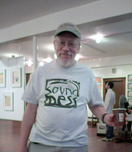INTERVIEW WITH JOHN M. BENNETT

Write a Bio
A short bio is available at
http://www.library.ohiou.edu/archives/mss/mss116.pdf
A more complete autobiography was published in CONTEMPORARY AUTHORS AUTOBIOGRAPHY SERIES, v. 25, Detriot: Gale, 1996.
This may be found in many libraries.
Describe the room or place where you like to write.
It's a small room in my home, built out over the driveway, and so crowded with books, CDs, objets d'art ("junk"),
rubber stamps, wooden and lead type, and files and piles of paper, that it's almost myself into my desk where I have
my pens, a no. 3 Underwood typewriter, and 2 computers.
You are a visual, experimental, and sound text poet. How many years have you been writing?
Who are some of your major influences in writing?
I have been writing as long as I can remember; it started when I was a very young child and has never stopped.
There was always something "magical" about it; it has always been a way of making the world.
I really don't like to discuss "influences", since there have been so many, but mainly because the concept of
influence is so ambiguous and slippery. For example, one can point to "influences" on my work that came AFTER
I started writing something that could be seen as having been "influenced" by an earlier writer/artist.
Culture is a give and take, a kind of swarming, and it is simplistic to think in terms of linear influences.
I saw you perform in Somerville a few years ago with Be Blank Consort and BuffFluxus.
It was an amazing night.
John M. Bennett with Be Blank Consort and BuffFluxus
You are constantly touring your work. What has this experience been like for you? You have been touring with
some of the same people, how do you keep finding inspiration?
I enjoy performing my work, it makes it come alive in a different way. I should say that when I perform my poetry,
I am a somewhat different person than the person who wrote it. I was an actor in my youth, and the poems become
roles that I inhabit. This means that another performer could do the same, and come up with an entirely different,
but equally valid, interpretation.
The Lost and Found Times is a magazine you published for close to 30 years. Discuss your experience and
challenges. Who were some regulars in your magazine? What did it feel like when you discontinued it?
LAFT was in part a way to be of service to the community of undervalued writers I am a part of, and also a
way for me to focus on and really pay attention to other writers and artists who were doing interesting things.
I suppose the process of having to select what I thought was the "best" work, was a way of refining my own
sensibilities. It was saddening to end it, but I'm getting older and slower, and the magazine was starting
to overwhelm me - especially my eyesight, which has been getting worse. But I'm glad to see that others have
taken up the cause, and there are a number of efforts out there that are filling any void that was left by the
end of LAFT. It has left me more time to get some of my own long-delayed books into print.
Discuss Luna Bisconte Prods and publications. How long have you been publishing books?
LBP started in 1974 as a way to make editions or multiple of work that no one else would publish - rather the
same mission as LAFT's - and also to publish things of my own over which I could have complete esthetic control.
Where do you find material for your poetry and images?
They come out of my head, which has been trained over many years, to find
and see them. They get into my head through the condition of my being alive.
Some people have no conception what experimental writing is or
understand it. Does this ever bother you? Do you find this frustrating?
No, I don't find it frustrating - "experimental" writing really just means
I am always looking for news ways to write, and in exploring new methods
etc. Naturally, it takes other people a while to "understand" it - it's
always been that way with new forms of expression, and new forms of
culture in general. I enjoy the exploration, finding new territory, and
actually rather emjoy the fact that I'm alone in that journey. That is,
alone in the moment of writing; I'm certainly not alone in that there are
others who work this way, and I find their companionship and their own
explorations very stimulating and meaningful.
Any last comments.
Be Blank!

|

